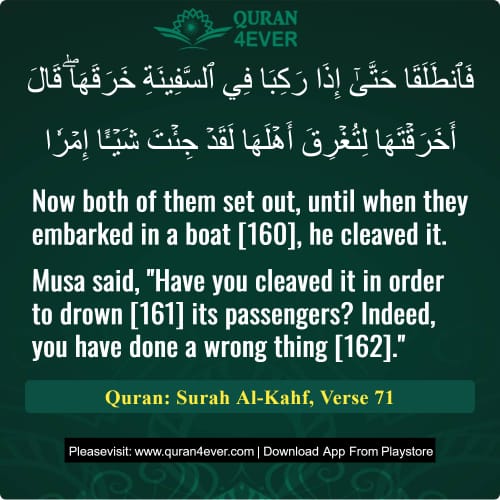
Transliteration:( Fantalaqaa hattaaa izaa rakibaa fis safeenati kharaqahaa qaala akharaqtahaa litughriqa ahlahaa laqad ji'ta shai'an imraa )
"Now both of them set out, until when they embarked in a boat [160], he cleaved it. Musa said, 'Have you cleaved it in order to drown [161] its passengers? Indeed, you have done a wrong thing [162].'"
When the inmates of the ship recognized Hazrat Khizr (on whom be peace), they allowed him and Hazrat Musa to board without fare. Hazrat Khizr did not board the ship out of necessity, but out of divine wisdom and foresight, which would be revealed later.
It is important to note that Hazrat Khizr was divinely protected from drowning, so his presence on the ship had no element of fear or need, only strategic divine purpose.
Hazrat Khizr broke the portion of the ship that stays underwater, yet water did not flood the ship—a sign of the miraculous blessings he carried.
From this, we learn that through the blessings and miracles of the pious, even sunken ships can be restored. If he had broken the upper part of the ship, Hazrat Musa would not have feared drowning, which shows that the risk appeared genuine to him due to where the damage was made.
Hazrat Musa (on whom be peace) did not object for himself, as he trusted Hazrat Khizr’s protection, but he feared for the lives of the innocent passengers. Hence, he said, “you have done a wrong thing”, referring to what seemed like an action that could endanger others.
This reinforces the prophetic sense of justice and concern for all people, especially when harm appears imminent—though the deeper wisdom would soon be revealed.
71. So they both proceeded, till, when they boarded the boat, he (Khidr) damaged it. Musa said: “Have you damaged it wherein its people will drown Verily, you have committed a thing Imr.” 72. He said: “Did I not tell you, that you would not be able to have patience with me” 73. He said: “Call me not to account for what I forgot, and be not hard upon me for my affair (with you).”
Allah tells us that Musa and his companion Al-Khidr set out having come to an agreement and reached an understanding. Al-Khidr had made the condition that Musa should not ask him about anything he found distasteful until he himself initiated the discussion and offered an explanation. So they went on board the ship, as described in the Hadith quoted above — the crew recognized Al-Khidr and let them ride on board free of charge, as an honor to Al-Khidr. When the boat took them out to sea and they were far from the shore, Al-Khidr got up and damaged the boat, pulling out one of its planks and then patching it up again. Musa, peace be upon him, could not restrain himself from denouncing him, so he said:
(Have you damaged it wherein its people will drown) The grammatical structure of the sentence in Arabic implies that this was the consequence, not the purpose, of his action.
(Verily, you have committed a thing Imr.) About `Imr’, Mujahid said: “An evil thing.” Qatadah said, “An astounding thing.” At this point, reminding him of the previously-agreed condition, Al-Khidr said:
(Did I not tell you, that you would not be able to have patience with me) meaning, `this thing that I did deliberately is one of the things I told you not to denounce me for, because you do not know the full story, and there is a reason and purpose for it that you do not know about.’
(He said), meaning, Musa said:
(Call me not to account for what I forgot, and be not hard upon me for my affair (with you).) meaning, `do not be harsh with me.’ Hence it says in the Hadith quoted above from the Messenger of Allah :
(In the first instance, Musa asked Al-Khidr because he had forgotten his promise.)
(18:71) Then the two went forth until, when they embarked on the boat, he made a hole in it, whereupon Moses exclaimed: “Have you made a hole in it so as to drown the people in the boat? You have certainly done an awful thing.”
There is no commentary by Abul Maududi available for this verse.

For a faster and smoother experience,
install our mobile app now.
Related Ayat(Verses)/Topics